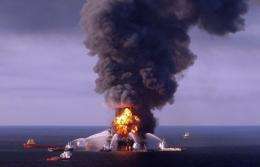A photo taken in April 2010 shows fire boat crews battling the blazing remnants of the BP operated off shore oil rig Deepwater Horizon in the Gulf of Mexico. Three separate bodies will now oversee offshore oil resources, once handled by an agency whose poor management was exposed after the Gulf of Mexico oil spill, US officials announced Wednesday.
Three separate bodies will now oversee offshore oil resources, once handled by an agency whose poor management was exposed after the Gulf of Mexico oil spill, US officials announced Wednesday.
President Barack Obama had promised to overhaul the Minerals Management Service (MMS) after the April explosion of the Deepwater Horizon rig leased by British giant BP off the Louisiana coast. The agency was denounced as dysfunctional and accused of being too close to the oil industry.
A recent report by the national commission that investigated the worst offshore oil spill in US history "underscores the need for deep structural and cultural reforms within the industry and to the regulations governing offshore drilling," Interior Secretary Ken Salazar said.
Another report had uncovered improper practices in the MMS offices in the Gulf state of Louisiana, where officials allegedly accepted gifts from oil and gas companies.
"We have launched the most aggressive and comprehensive reforms to offshore oil and gas regulation in US history," Salazar said.
Renamed the Bureau of Ocean Energy Management, Regulation and Enforcement (BOEMRE) last June after the oil spill, the MMS will now be split into three agencies.
The first branch, whose launch was announced in October, is responsible for collecting taxes from mineral and oil exploitation. It's called the Office of Natural Resources Revenue.
Salazar said the other agencies were the Bureau of Ocean Energy Management -- handling permits and environmental studies -- and the Bureau of Safety and Environment Enforcement, responsible for enforcing safety and environmental regulations.
"The former MMS was saddled with the conflicting missions of promoting resource development, enforcing safety regulations, and maximizing revenues from offshore operations," said Michael Bromwich, the former director of BOEMRE, who will oversee the new agencies.
"The reorganization is designed to remove those conflicts by clarifying and separating missions across the three agencies and providing each of the new agencies with clear missions and new resources necessary to fulfill those missions."
The explosion of the BP-leased rig spewed a record 4.9 million barrels of toxic crude into the Gulf before the gushing Macondo well was capped three months later. Eleven workers were killed in the incident.
The environmental impact is still being felt in the region, where oil washed up on beaches, tainted fragile marshlands, caused the authorities to close down vast areas of water to commercial fishing and shrimping, and crippled tourism.
Salazar also announced the creation of a 13-member Offshore Energy Safety Advisory Committee, which will include scientists, engineers and university experts who will give recommendations to the agencies.
(c) 2011 AFP
























